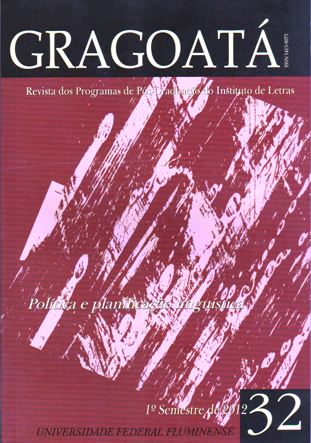A place of representation by the language: the lectureship program of the Brazilian Ministry of Foreign Affairs
DOI:
https://doi.org/10.22409/gragoata.v17i32.33039Keywords:
Portuguese as a foreign language, Brazilian language-spread policy, lectureshipAbstract
Based on the History of Linguistic Ideas, in its relation to the Discourse Analysis from a materialistic perspective, we analyze some aspects concerning the Brazilian language-spread policy, specifically, the imagery which signifies the lecturer of the Ministry of Foreign Affairs, officially defined as “the university teacher, of Brazilian nationality, who is dedicated to the teaching of the Portuguese language spoken in Brazil, and of the national culture and literature in foreign university institutions (BRASIL, 2006). It is possible to notice some heterogeneity in their work field, indicative of the fact that the lectureships are subordinated to the foreign institutions rather than to the Brazilian State. In addition, lecturers tend to be signified as representatives of Brazil, despite the polemics over what / whom they should represent. Therefore, through the national language, as a sign of the Brazilian culture, a place of cultural and/or diplomatic representation of Brazil is constructed.
Downloads
Downloads
Published
How to Cite
Issue
Section
License
Authors who publish in Gragoatá agree to the following terms:
The authors retain the rights and give the journal the right to the first publication, simultaneously subject to a Creative Commons license CC-BY-NC 4.0, which allows sharing by third parties with due mention to the author and the first publication by Gragoatá.
Authors may enter into additional and separate contractual arrangements for the non-exclusive distribution of the published version of the work (for example, posting it in an institutional repository or publishing it in a book), with recognition of its initial publication in Gragoatá.

Gragoatá is licensed under a Creative Commons - Attribution-NonCommercial 4.0 International.











